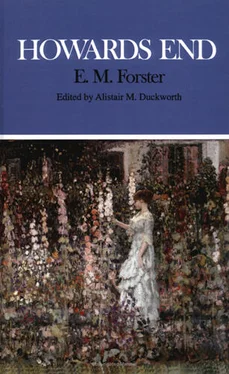Edward Morgan Forster - Howards End
Здесь есть возможность читать онлайн «Edward Morgan Forster - Howards End» весь текст электронной книги совершенно бесплатно (целиком полную версию без сокращений). В некоторых случаях можно слушать аудио, скачать через торрент в формате fb2 и присутствует краткое содержание. Жанр: Классическая проза, на английском языке. Описание произведения, (предисловие) а так же отзывы посетителей доступны на портале библиотеки ЛибКат.
- Название:Howards End
- Автор:
- Жанр:
- Год:неизвестен
- ISBN:нет данных
- Рейтинг книги:3 / 5. Голосов: 1
-
Избранное:Добавить в избранное
- Отзывы:
-
Ваша оценка:
- 60
- 1
- 2
- 3
- 4
- 5
Howards End: краткое содержание, описание и аннотация
Предлагаем к чтению аннотацию, описание, краткое содержание или предисловие (зависит от того, что написал сам автор книги «Howards End»). Если вы не нашли необходимую информацию о книге — напишите в комментариях, мы постараемся отыскать её.
Howards End — читать онлайн бесплатно полную книгу (весь текст) целиком
Ниже представлен текст книги, разбитый по страницам. Система сохранения места последней прочитанной страницы, позволяет с удобством читать онлайн бесплатно книгу «Howards End», без необходимости каждый раз заново искать на чём Вы остановились. Поставьте закладку, и сможете в любой момент перейти на страницу, на которой закончили чтение.
Интервал:
Закладка:
"Why don't you tell Mr. Wilcox?"
"About Helen?"
"Perhaps he has come across that sort of thing."
"He would do all he could, but—"
"Oh, you know best. But he is practical."
It was the student's belief in experts. Margaret demurred for one or two reasons. Presently Helen's answer came. She sent a telegram requesting the address of the furniture, as she would now return at once. Margaret replied, "Certainly not; meet me at the bankers at four." She and Tibby went up to London. Helen was not at the bankers, and they were refused her address. Helen had passed into chaos.
Margaret put her arm round her brother. He was all that she had left, and never had he seemed more unsubstantial.
"Tibby love, what next?"
He replied: "It is extraordinary."
"Dear, your judgment's often clearer than mine. Have you any notion what's at the back?"
"None, unless it's something mental."
"Oh—that!" said Margaret. "Quite impossible." But the suggestion had been uttered, and in a few minutes she took it up herself. Nothing else explained. And London agreed with Tibby. The mask fell off the city, and she saw it for what it really is—a caricature of infinity. The familiar barriers, the streets along which she moved, the houses between which she had made her little journeys for so many years, became negligible suddenly. Helen seemed one with grimy trees and the traffic and the slowly-flowing slabs of mud. She had accomplished a hideous act of renunciation and returned to the One. Margaret's own faith held firm. She knew the human soul will be merged, if it be merged at all, with the stars and the sea. Yet she felt that her sister had been going amiss for many years. It was symbolic the catastrophe should come now, on a London afternoon, while rain fell slowly.
Henry was the only hope. Henry was definite. He might know of some paths in the chaos that were hidden from them, and she determined to take Tibby's advice and lay the whole matter in his hands. They must call at his office. He could not well make it worse. She went for a few moments into St. Paul's, whose dome stands out of the welter so bravely, as if preaching the gospel of form. But within, St. Paul's is as its surroundings—echoes and whispers, inaudible songs, invisible mosaics, wet footmarks crossing and recrossing the floor. Si monumentum requiris, circumspice: it points us back to London. There was no hope of Helen here.
Henry was unsatisfactory at first. That she had expected. He was overjoyed to see her back from Swanage, and slow to admit the growth of a new trouble. When they told him of their search, he only chaffed Tibby and the Schlegels generally, and declared that it was "just like Helen" to lead her relatives a dance.
"That is what we all say," replied Margaret. "But why should it be just like Helen? Why should she be allowed to be so queer, and to grow queerer?"
"Don't ask me. I'm a plain man of business. I live and let live. My advice to you both is, don't worry. Margaret, you've got black marks again under your eyes. You know that's strictly forbidden. First your aunt—then your sister. No, we aren't going to have it. Are we, Theobald?" He rang the bell. "I'll give you some tea, and then you go straight to Ducie Street. I can't have my girl looking as old as her husband."
"All the same, you have not quite seen our point," said Tibby.
Mr. Wilcox, who was in good spirits, retorted, "I don't suppose I ever shall." He leant back, laughing at the gifted but ridiculous family, while the fire flickered over the map of Africa. Margaret motioned to her brother to go on. Rather diffident, he obeyed her.
"Margaret's point is this," he said. "Our sister may be mad."
Charles, who was working in the inner room, looked round.
"Come in, Charles," said Margaret kindly. "Could you help us at all? We are again in trouble."
"I'm afraid I cannot. What are the facts? We are all mad more or less, you know, in these days."
"The facts are as follows," replied Tibby, who had at times a pedantic lucidity. "The facts are that she has been in England for three days and will not see us. She has forbidden the bankers to give us her address. She refuses to answer questions. Margaret finds her letters colourless. There are other facts, but these are the most striking."
"She has never behaved like this before, then?" asked Henry.
"Of course not!" said his wife, with a frown.
"Well, my dear, how am I to know?"
A senseless spasm of annoyance came over her. "You know quite well that Helen never sins against affection," she said. "You must have noticed that much in her, surely."
"Oh yes; she and I have always hit it off together."
"No, Henry—can't you see? —I don't mean that."
She recovered herself, but not before Charles had observed her. Stupid and attentive, he was watching the scene.
"I was meaning that when she was eccentric in the past, one could trace it back to the heart in the long run. She behaved oddly because she cared for someone, or wanted to help them. There's no possible excuse for her now. She is grieving us deeply, and that is why I am sure that she is not well. 'Mad' is too terrible a word, but she is not well. I shall never believe it. I shouldn't discuss my sister with you if I thought she was well—trouble you about her, I mean."
Henry began to grow serious. Ill-health was to him something perfectly definite. Generally well himself, he could not realize that we sink to it by slow gradations. The sick had no rights; they were outside the pale; one could lie to them remorselessly. When his first wife was seized, he had promised to take her down into Hertfordshire, but meanwhile arranged with a nursing-home instead. Helen, too, was ill. And the plan that he sketched out for her capture, clever and well-meaning as it was, drew its ethics from the wolf-pack.
"You want to get hold of her?" he said. "That's the problem, isn't it? She has got to see a doctor."
"For all I know she has seen one already."
"Yes, yes; don't interrupt." He rose to his feet and thought intently. The genial, tentative host disappeared, and they saw instead the man who had carved money out of Greece and Africa, and bought forests from the natives for a few bottles of gin. "I've got it," he said at last. "It's perfectly easy. Leave it to me. We'll send her down to Howards End."
"How will you do that?"
"After her books. Tell her that she must unpack them herself. Then you can meet her there."
"But, Henry, that's just what she won't let me do. It's part of her—whatever it is—never to see me."
"Of course you won't tell her you're going. When she is there, looking at the cases, you'll just stroll in. If nothing is wrong with her, so much the better. But there'll be the motor round the corner, and we can run her up to a specialist in no time."
Margaret shook her head. "It's quite impossible."
"Why?"
"It doesn't seem impossible to me," said Tibby; "it is surely a very tippy plan."
"It is impossible, because—" She looked at her husband sadly. "It's not the particular language that Helen and I talk if you see my meaning. It would do splendidly for other people, whom I don't blame."
"But Helen doesn't talk," said Tibby. "That's our whole difficulty. She won't talk your particular language, and on that account you think she's ill."
"No, Henry; it's sweet of you, but I couldn't."
"I see," he said; "you have scruples."
"I suppose so."
"And sooner than go against them you would have your sister suffer. You could have got her down to Swanage by a word, but you had scruples. And scruples are all very well. I am as scrupulous as any man alive, I hope; but when it is a case like this, when there is a question of madness—"
"I deny it's madness."
"You said just now—"
Читать дальшеИнтервал:
Закладка:
Похожие книги на «Howards End»
Представляем Вашему вниманию похожие книги на «Howards End» списком для выбора. Мы отобрали схожую по названию и смыслу литературу в надежде предоставить читателям больше вариантов отыскать новые, интересные, ещё непрочитанные произведения.
Обсуждение, отзывы о книге «Howards End» и просто собственные мнения читателей. Оставьте ваши комментарии, напишите, что Вы думаете о произведении, его смысле или главных героях. Укажите что конкретно понравилось, а что нет, и почему Вы так считаете.












